Disability: 'People assume I can't be gay because I'm disabled'
On a video on Tik Tok, Stephen Thomas Smith looks into the camera and shouts: "I am a gaaaaaaaaaaaay!"
It's his reaction to people who assume that he must be straight or doesn't have any sexual feelings simply because he's disabled.
Stephen, who has cerebral palsy, is a disability and gay rights campaigner and uses Tik Tok as a way to raise awareness on the issues.
But he admits sometimes he doesn't feel like he's part of the LGBT community because he often comes up against "ableism" - discrimination against people with disabilities.
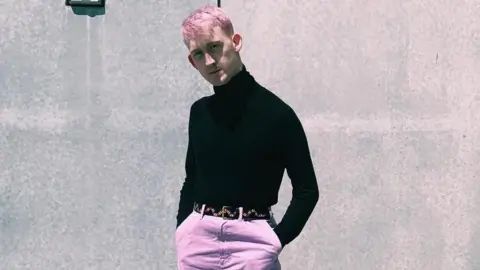 Handout
Handout"When I go to G-A-Y or Pride I get denied access to nightclubs because I'm 'too drunk' - when actually I'm sober - and I get told I'm on drugs," says Stephen.
"That's my community and it's supposed to be accepting but yet I go to that 'safe space' and get denied access.
"So why would I associate myself with a community that's so ableist. I'm not particularly proud to be part of that community as a disabled person."
Stephen, 24, says the ableism he experiences means he often doesn't feel like he "has an identity" within the LGBT space.
"You feel like you're in the middle ground or this place of nowhere because I'm disabled, so I'm supposed to be with disabled people.
"But I'm also gay but they don't accept me. It feels like I'm in the middle and I have no identity. It's weird."
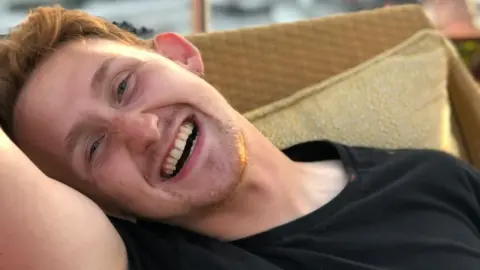 Handout
HandoutWhen Stephen he told his family he was gay, he says it wasn't really a big thing as he has two older sisters who are lesbians.
But it was more of a surprise to people at his secondary school because he was just seen as the "person in the wheelchair".
"It was easy to come out but I think people didn't expect it," says Stephen. "But my mum expected it because I'm as camp as Christmas.
"I don't think people usually think, 'Oh this disabled person is gay or straight or they want to interact or they have desires'.
"In high school I was just seen as the disabled kid."
Stephen, who is from Manchester but lives in London, says even now when he goes on dates he experiences ableism which can feel "dehumanising".
"I went on a date once and I met him for a coffee and he just sat down with me and he said, 'This is like the show the Undateables'," he says.
"I was like, 'Cool, the first think you see is my disability, not my outfit'. So what I did was just walk out because I've not no time for ableism."
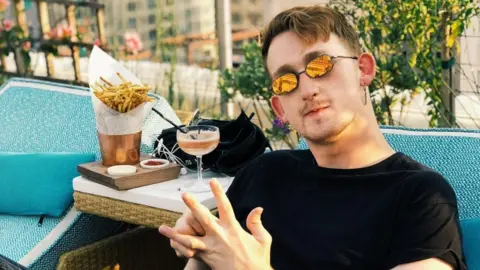 Handout
HandoutStephen believes people often see those with a disability as being asexual because of the way disability is portrayed in the media.
"We're portrayed to be helpless creatures who depend on people and we're created to be animated," he says.
"And we don't fit into a certain gender - to be a man is to be strong, is to walk and talk in a certain way, and to be a woman is the same but as a woman.
"Because disabled people can't abide to that etiquette of the body, we're seen to be asexual, dependant creatures.
"We still have desires and we have our own minds. People need to stop looking at the physical and start really looking at people."
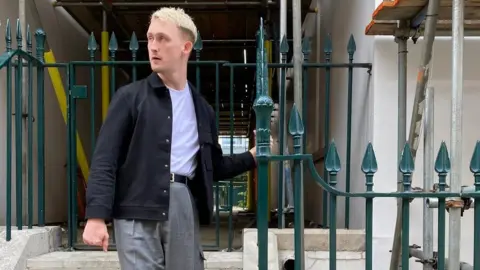 Handout
HandoutStephen has been using Tik Tok for less than a year but already has 48,000 followers and 1.2 million likes.
In his videos, he uses sarcasm and humour to raise awareness and address some of the misconceptions he experiences as a disabled gay person.
"Laughter is a gateway and instead of people laughing at me, they're laughing with me and I think that's important," Stephen says.
"It allows people to understand more about your disability and instead of being turned off, it's more of a gateway for people to access it.
"I still get a load of hate comments but I reply to those in a funny way. Someone called me spaghetti hands so I made a funny video about having spaghetti hands.
"It doesn't really affect me because I'm living my best life over here."
Stephen says even though he gets some hateful comments, he also has lots of positive ones too.
"I get loads of messages every month saying either their son's got cerebral palsy and I've helped them understand it or I made someone laugh.
"I think the videos break a stigma because it allows people to have an insight into disability and queer disability and the queer body.
"I think the people who are hateful just need more education or more visibility."
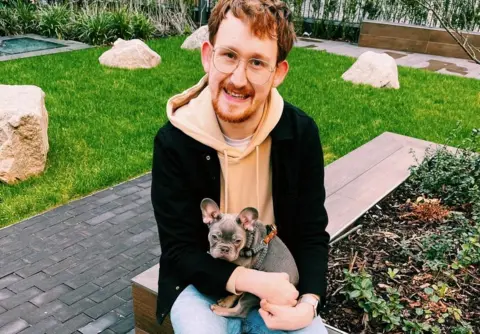 Handout
HandoutStephen's cerebral palsy means he has a carer and uses a wheelchair if he's travelling long distances - for example through an airport.
But he doesn't feel like he is limited by his disability and has just been accepted to study a MA in photography at the Royal College of Art in London.
Stephen believes better representation of disabled people in the media would help combat ableism and discrimination in society.
He believes the show The Undateables - which follows disabled people on dates - is "patronising" and "toxic" for disability representation.
"I'd like to see more disabled people in mainstream media and more visibility, Stephen says. "I'd like to see some bad-ass disabled people doing some amazing things."
